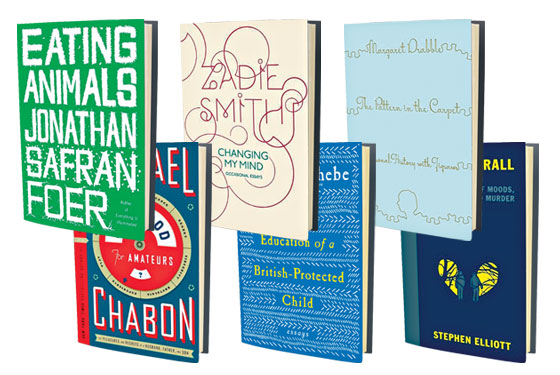
Ben Yagoda, author of the forthcoming Memoir: A History, notes that the literary memoir, once a career capstone, has lately become a novelist’s third or fourth book—a good excuse for a breather or a chance to put his magazine work between hard covers. This season is rife with novelists’ digressions, most of them a little self-conscious—even defensive—about cheating on their novels. They promise riches as wonderful and offbeat as fiction, and they run the gamut from solipsism to (almost) literature.
title added-value topic apologia for memoirizing literary brethren

Eating Animals, by Jonathan Safran Foer (Little, Brown; November 2). Our quirky author’s investigations into the meat industry, prompted by his own on-and-off vegetarianism. Fathering a child forced the Park Sloper to confront the issue: “I suddenly felt an urgency because I would have to make decisions on his behalf,” Foer said recently. Michael Pollan’s The Omnivore’s Dilemma; Peter Singer’s Animal Liberation.

Manhood for Amateurs, by Michael Chabon (HarperCollins; October 6) “The pleasures and regrets of a husband, father, and son,,” per the subtitle—but mostly the father part—agonizing over circumcision and other haute-bourgeois quandaries. To show himself—and us—how humble he is about his shortcomings as a parent: “A father is a man who fails every day.” Bad Mother, by his own wife, Ayelet Waldman; Neal Pollack’s Alternadad.

Changing My Mind: Occasional Essays, by Zadie Smith (The Penguin Press; November 16) Chapters read like personality-test results, with essays divided into “Reading,” “Being,” “Seeing,” “Feeling,” and “Remembering”—the last section on David Foster Wallace. “This book was written without my knowledge,” writes Smith. “I had thought I was writing a novel. Then I thought I was writing a solemn, theoretical book about writing.” Failing to meet those deadlines, she submitted a ton of magazine articles. Jonathan Franzen’s The Discomfort Zone; Jonathan Lethem’s The Disappointment Artist.

The Education of a British-Protected Child, by Chinua Achebe (Alfred A. Knopf; October 8) The experience of growing up in Nigeria at the crossroads of Christianity, tribal tradition, and the British Empire, via essays collected from the last two decades. “I wanted very much to shine the torch of variety and of difference on the experiences my life has served up to me,” he writes, making this a more-traditional career-capping memoir for the 78-year-old. The Education of Henry Adams; Jamaica Kincaid’s A Small Place.

The Pattern in the Carpet: A Personal History With Jigsaws, by Margaret Drabble (Houghton Mifflin Harcourt; September 16) “This book is not a memoir, although parts of it may look like a memoir,” begins novelist Margaret Drabble. “Nor is it a history of the jigsaw puzzle, although it was once meant to be. It is a hybrid.” “Doing jigsaws and writing about them has been one of my strategies to defeat melancholy and avoid laments,” Drabble writes. It was also a way to talk about her childhood without offending anyone too much. Proust’s Remembrance of Things Past; Stefan Fatsis’s Word Freak.

The Adderall Diaries, by Stephen Elliott (Graywolf; September 1) The trial of a murderer leads Elliott back to his nights in San Francisco’s S&M clubs, and helps break a bad case of writer’s block and an epic spree of self-destructive behavior. “This book begins with a suicidal urge. If I was going to kill myself anyway, I could write whatever I wanted. And that’s what I started to do.” James Frey’s A Million Little Pieces; Truman Capote’s In Cold Blood; the Marquis de Sade.
